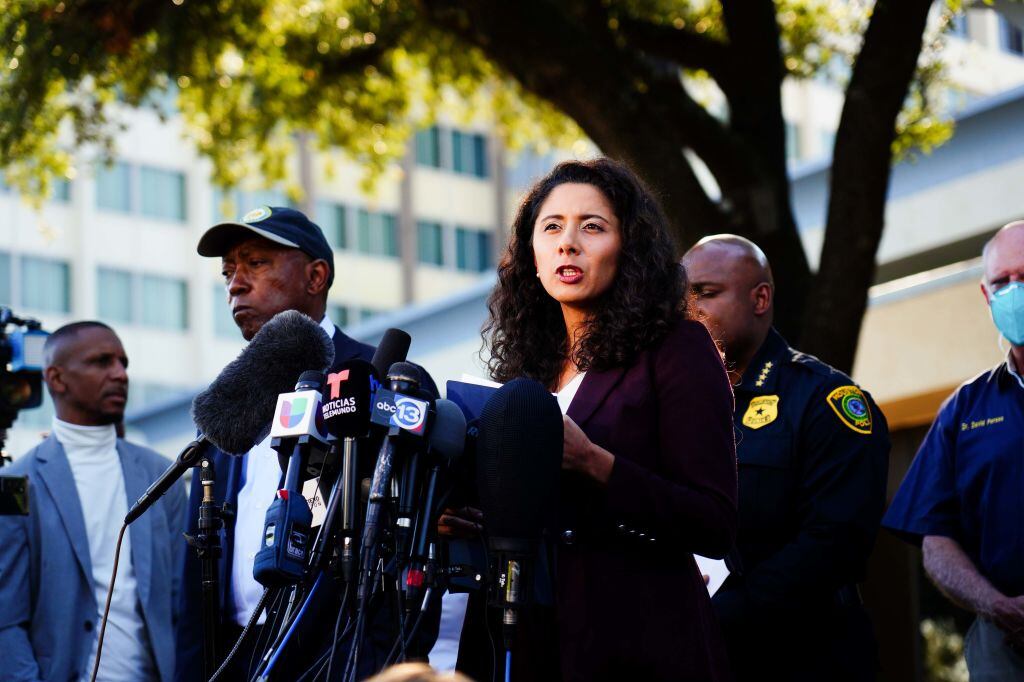Votebeat is a nonprofit news organization reporting on voting access and election administration across the U.S. Dig deeper into how our democracy works with Votebeat’s free newsletters.
Two years after supporters of former President Donald Trump breached the U.S. Capitol to prevent Congress from certifying the 2020 presidential election, attempts to undermine the 2022 midterms in key states took a different form.
It tells us something, at least about the next step in the evolution of the Stop the Steal Movement.
This time around, more than a dozen losing candidates in Harris County filed election contests with slim prospects of success after some Harris County polling places ran out of ballot paper. It’s certainly less violent than an armed insurrection, but the problems will hang over Harris County elections for some time.
And in Pennsylvania and Michigan, obscure provisions of state law allowed election skeptics to force recounts without providing evidence of problems. In Arizona, the GOP candidate for governor has seized upon technical problems in Maricopa County to assert the election should be overturned.
In some states, these tactics forced delays in certification, even though they had little chance of ultimately changing the outcome of the election.
It’s important to note that all of these attempts took place within the confines of existing laws, or involved very real examples of election administration problems. So if the tactics are legal and critics are pointing to legitimate problems with elections, it’s fair to ask why any of this would be corrosive. After all, Votebeat reporters have been relentlessly digging into 2022’s election administration problems, too.
Part of the answer is that the recounts in Pennsylvania and election contests in Texas, though permitted by the law, involve using statutes in ways that weren’t originally envisioned with an apparent goal of dragging out the elections. Instead, they were written to protect against clear manipulation of the system — no one has presented compelling evidence of such a thing here.
These efforts are absorbing already scant public resources and fomenting doubts. If the elections are legitimate, after all, why does it take so long to declare them final?
And all of this seems like quite the trap: There are always going to be election administration problems, and there’s no such thing as a perfect election. Printers will fail. People will open polling places late. And election administrators will make mistakes.
Election administrators have to be transparent about their own errors, something that’s hard to do when people are constantly leveling accusations of intentional wrongdoing.
It’s important for reporters covering these issues to recognize when mistakes have been made without malice. Understanding what happened takes the ability to focus only on this beat — a thing that, if you read this newsletter you know, takes a lot of time. It’s why Votebeat’s Jen Fifield has continued reporting on Maricopa’s election problems, and why Natalia Contreras has chased answers to lingering questions in Harris County, Texas.
As 2024 draws closer by the day, we’ll see this movement take other forms. Subscribe to our state-level newsletters, and keep track of every evolution.
Back Then
On this day in 1784, the Continental Congress ratified the Treaty of Paris in Annapolis, Maryland, formally ending the Revolutionary War and establishing the United States as its own country. Representatives did so in the Old Senate Chamber of the Maryland State House, making Annapolis the first peacetime capital of the young country. British ratification occurred in April of the same year.
New from Votebeat
Arizona reporter Jen Fifield takes a look at six ways mistakes in the midterms can help Arizona improve in 2024 — complete with an interview with Katie Hobbs, new governor, old secretary of state.
In Texas, Natalia Contereras reports that two bills have been introduced that would expand the authority of the state’s attorney general — presently Republican Ken Paxton — to prosecute election crimes, and punish local officials who refuse to do the same.
Lycoming County, Penn. has finished its hand recount of the 2020 election, Carter Walker reports. While the totals changed slightly, none of the results changed. Election workers found, as they did in 2020, that Trump overwhelmingly won the election. Ultimately, Trump received seven fewer votes than he did in the original count. Biden received 15 fewer votes.
Special elections to fill Pennsylvania House seats vacated by Democrats should be held on Feb. 7, a Pennsylvania court ruled Friday, Walker reports with Stephen Caruso of Spotlight PA.
In Other Voting News
- A federal appeals court in Little Rock heard arguments this week about whether the Voting Rights Act of 1964 allows lawsuits brought by individuals, rather than only the Department of Justice. A lower court had previously dismissed challenges to Arkansas’ redistricting maps on the grounds that private groups could not sue under the VRA.
- Perry County Commission Chairman Albert Turner Jr. — the son of Alabama civil rights activists — has been indicted on voter fraud charges related to allegations he voted more than once. He is accused of running multiple ballots through a voting machine during the May 2022 Democratic primary election. Turner called the charge “political theater” in a text to the Associated Press.
- Those convicted of a felony are one step closer to regaining the right to vote in Minnesota, after Democrats there introduced a bill that would allow more than 66,000 people in the state to cast a ballot.
- A report found that the test of VotingWorks’ machine in New Hampshire last year was mostly successful, though the company ran into issues during tabulation.
- Jason Schofield, a former elections official in upstate New York, pleaded guilty on Wednesday on charges related to the fraudulent use of voter data to apply for a dozen absentee ballots in 2021. The plea is part of a much broader investigation into potential ballot fraud across Rensselaer County, which is east of Albany.
- A Lubbock, Texas man has been indicted by a federal grand jury for allegedly posting threats against Arizona poll workers on the rightwing social media platform “Patriots.win.”
Carrie Levine is Votebeat’s story editor and is based in Washington, D.C. Contact Carrie at clevine@votebeat.org.






